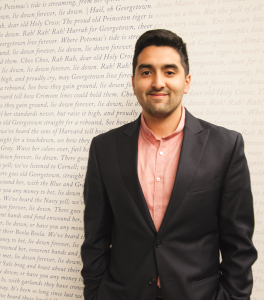
Juan Gonzalez (COL ’15) spent an enlightening semester in India working with microfinance.
Not many people consider the slums of Pune, India, to be their desired study-abroad destination. But College senior Juan Gonzalez had an invaluable experience studying economics in Pune while interning with the microfinance organization Parvati Swayamrojgar. In true Jesuit fashion Juan spent his spring semester as a man for others helping the initiative develop its structure for the upcoming years and learning the ins and outs of the community.
What got you interested in microfinance?
I went to India to study economics. While I was there, I was able to work with a microfinance organization that was already in place. I think microfinance is the kind of vehicle that impoverished people can use for development and that’s needed to leverage public and private interests. I think that’s why I believe in microfinance — it gives people the opportunity to decide for themselves how they can improve their lives.
Can you speak as to why you think it is so critical that microfinance is not viewed as a handout?
The loans that were given by the organization were very limited, so it is not like you could take out money to gamble or do random ventures — it’s more specific for education, rebuilding your house or for business. It is tailored to that. That sort of conservative model is why their model is so successful, but I think it is important that microfinance is some sort of repayment loan because it gives some sense of entitlement. It gives people a hold on their present and a hold on their future, whereas a handout most people can take for granted. I know statistically speaking that higher than 90 percent of the world’s poorest people repay their loans at the full (or at least in Pune where I was). It just goes to show that people want an opportunity to move forward and people want that opportunity to develop.
Can you speak a little to your day-to-day work in Pune?
I worked for seven hours a day. I would need a translator with me because [the clients] only spoke Marati, no English whatsoever. I asked a lot of questions and read a lot of material. I did research for microfinance in India as a whole. I kind of compiled what the organization PSW was doing and consulted them. In doing that I got to interview around 30 different slum dwellers and got to visit their homes and interact with the families that were recipients of their loans.
Did you experience some of the issues associated with microfinance, such as debt accumulation and loan sharking, during your work?
What I saw and studied is that it just takes one bad apple to ruin the whole system. India right now as a whole is facing this transition in which they have to make policies that prevent people from exploiting other people. Right now the infrastructure and policy for microfinance in India is very young. There is definitely room for people to exploit impoverished communities in places like that.
In your experience, do you find that the caste system is a reflection or reinforcement of the socioeconomic divides within India?
From what I learned and what I read I think yes, that is exactly what society is built like. The wealthy people are of the higher castes, and I think it really is just a residual effect of the past.
Do you think that helping socioeconomically can help to remove some of the social barriers or issues they have had in the past?
Yeah definitely. I think microfinance is one of the most important things for India’s development and for emerging countries as a whole. These populations in the slums represent an enormous amount of India’s population that cannot be served by traditional banking because they do not have documentation. But as it has risen some people have taken it as an opportunity to make money for themselves and some have used it as an opportunity to genuinely build something that they can pass on to future generations.
You have also started to work with an organization called the Mercy Corps. How does that compare with your work back in India?
Mercy Corps works on development issues but more through quasi-microfinance initiatives and so far it is that they invest money into key organizers so that people can use that money for themselves. What I saw in my experience with the Mercy Corps was that this was the outside perspective. Because here in India I deal with the people who use the money and the institutions that distribute the money. Mercy Corps applies for grants and projects and implements them around the world to spur economic development and create change from the ground up. Their mission is something that really resonated with me. It was a great summer internship I got to learn a lot.
Is there anything else you would like to add?
I would encourage everyone to study abroad in less traditional places like India, Africa or the Southeast in general. There is so much more to be learned than from a traditional European experience. The opportunities are out there, sometimes you just gotta ask. It was one of the best times of my life, I made some great friends and learned so much.
India with its caste system or the social structures that have been left there although they are eroding they are still in place. The lower castes are still in the category of society where they are still poor. Even if they aren’t oppressed institutionally they are societally because that (the caste system) is still very present. Now these people truly have the opportunity to try to make a move up.



















